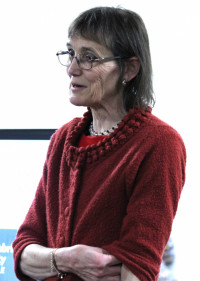Under the Ice: the sounds of Antarctica, by poet, composer, and scientists

“Immense creaks, cracks, rumbles …” a few of the opening words from Northumberland poet Katrina Porteous’s ‘Under the Ice’, a 30-minute poetry performance with electronic music by the late Peter Zinovieff, and a collaboration between poet, composer and scientists from Northumbria University’s Cold and Palaeo-Environments research team. It received its in-person premiere on Saturday night at Gallery @NO.6, a creative space on the High Street of Wooler in the north Northumberland hills. There were no lights on in the room for most of the evening; as Porteous continued to read it just got darker and darker.
“Sea level, what does it mean, always provisional …” The performance takes listeners on a journey beneath Antarctica’s surface, to discover mountains, valleys, lakes and volcanoes, hidden landscapes, and explores the scientists’ research, including remote sensing techniques and understanding more about the movements of glaciers. Zinovieff’s electronic music, unsettling, unearthly, sometimes rumbling like a volcano, sometimes sounding like the planet spinning on its axis, was derived from real sounds from Antarctic glaciers, recorded by Northumbria University researcher Dr Kate Winter, and samples contributed by sound artist Chris Watson and Australian scientist Philip Samartzis.
“Antarctica, without its ice, springs back, naked … old bones … black vertebrae …” Porteous explained that this was the fifth and final collaboration that she had worked on with Zinovieff, a composer well ahead of his time, in her view (“I think electronic music is still catching up with him to this day”). He was performing with computers as long ago as the 1960s, and worked with Harrison Birtwhistle, and rock performers such as Pink Floyd. ‘Under the Ice’ was completed during lockdown, and poet and composer never physically met during its formation, but worked on it online. “We started with the raw sounds of the ice … I wrote some draft words, portals, sent them to Peter … he responded to those … it went backwards and forwards.” Sadly Zinovieff died at the age of 88 on the day of its online premiere, a Zoom webinar via the Wordsworth Trust at Grasmere. “So this piece has huge emotional resonance for me,” Porteous added.

“Ice, you are information … multiple, glittering streams of information …” Catastrophic climate change has happened many times in geological history. The scientists have been trying to understand more about the processes involved. Antarctica’s rocky world beneath the ice sheets can now be mapped and ‘made visible’ by means of remote sensing techniques. The performance ended with Porteous’s words drifting away, and the sound of an explosion.
Katrina Porteous, a freelance poet, historian and broadcaster, was born in Aberdeen, and has lived on Northumberland’s coast since 1987. She is best known for her innovative radio-poetry, and her most recent full collection, Edge (Bloodaxe, 2019) draws on her long involvement in scientific projects. ‘Under the Ice’, her new work, is as yet unpublished.
Her performance on Saturday was staged by Wooler Arts, who only the night before had been running their monthly poetry open-mic night in the Warm Hub of the local URC church, a very relaxed and well-attended gathering. Wooler was recently described approvingly – albeit in slightly amazed terms - in a national newspaper as being "in the middle of nowhere" but where you can nevertheless get artisan cheese and take in poetry events! I reached it via a 20-mile drive up the A697 that is as straight as the old Roman road it must once have been, without any roundabouts or traffic lights. If you keep going you’ll soon arrive in Scotland. Northumberland’s unofficial motto remains: “Shhh, don’t tell anyone.”
Oops …




